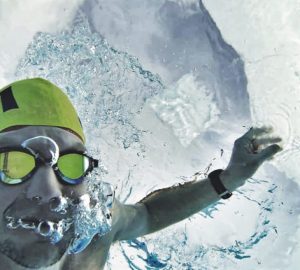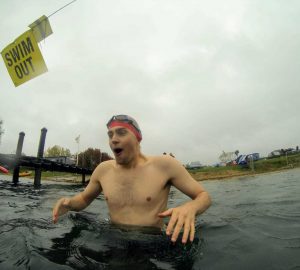
Swim away the blues: the mental health benefits of cold water swimming
We’ve all heard the stories about how cold-water swimming helps promote good mental health. Rowan Clarke asks why icy dips make us feel so good.
You may have started outdoor swimming to improve your fitness and discovered something more—incredible benefits for your mental health. Or, you might have taken the plunge because you heard that it helps your mental health.
As more outdoor swimmers discover the benefits, science is starting to unravel why swimming in cold water is so curative.
Group therapy
Standing on the edge of a tidal pool with people of all ages, sexes, sizes, shapes, backgrounds, and abilities, the sense of camaraderie is palpable. This group, led by psychologist and life coach Claire Paul, has met informally every Tuesday morning for nearly seven years. Set up in 2018, it was one of the first groups to focus exclusively on mental health and wellbeing, rather than swimming skills.
“Last year there was a programme on the BBC about a woman who had treated depression by cold water swimming, so much so that she’s been able to give up anti-depressants,” said Claire. “This was what inspired me to start the weekly outdoor swimming meetup, coupled with my love of outdoor swimming and working with people who have depression and all that goes with it.”
“Science is starting to unravel why swimming in cold water is so curative”
From a social point of view, this camaraderie is exactly the kind of therapy a doctor or social prescriber might recommend for conditions like depression and anxiety. This, coupled with exercise and being outdoors, is self-care that has been prescribed for many years.
Blue views
It’s long been understood that exercise makes us happy. When you increase your heart rate by exercising, your brain recognises it as stress. Your body responds by releasing a protein called Brain-Derived Neurotrophic Factor (BDNF), which helps protect and repair your memory neurons. At the same time, you release endorphins, which block the discomfort of exercise. So, the BDNF makes your mind feel clearer, and the endorphins make you feel euphoric.

In 2015, scientists studied the effect of exercise with different views of simulated natural environments. A group of post-menopausal women was asked to do 15 minutes on an exercise bike while facing either a blank wall (control) or watching project videos of urban (grey), countryside (green), or coast (blue) environments. The test showed the most psychologically positive results in the women who watched the blue video.
Bring together those three elements, camaraderie, exercise and blue views, and you start to understand why swimming outdoors has such a profound effect on our sense of wellbeing. However, more recent research is starting to expand theories that there are also physiological benefits from the cold water itself.
Clevedon swimmer Pete White has been swimming throughout winter for many years. “I have always been a very sociable person and have been keen to take part in group sports,” he says. “Whilst social interaction and walking, running, cycling, climbing etc. supported moderate relief from depression and anxiety, nothing has provided the benefits that cold water has.”
Cold water adaptation
In September 2018, the British Medical Journal published a case report about the theories around cold water adaptation as a treatment for depression. Co-authored by Dr Mark Harper, a cold-water swimmer behind the BBC documentary, the report looks at the physical responses to swimming in cold water.
“Cold water swimming is a holistic therapy”
The theory revolves around our stress response and inflammation. Immersing yourself in cold water puts your body into fight-or-flight mode, starting with the cold-water shock response. Dipping into cold water puts your body under stress. As you repeat this experience, you attenuate that stress response. Having a better rein on your stress response means being able to cope better with life’s many minor irritations that add up to chronic stress.
“Our bodies don’t differentiate between types of stress,” says Mark. “Every day low-level stresses make things worse, but the significant physical stress of getting into cold water attenuates our stress response as we adapt to it.”
This diminished stress response is about activating the parasympathetic nervous system. Known as the ‘rest and digest’ system, the parasympathetic nervous system is responsible for slowing your heart rate and increasing intestinal and gland activity.

A key part of this system is the vagus nerve, which connects your brain to organs including your heart and lungs. It’s the tone of this vagus nerve that relates to mental health; if you have high vagal tone, your parasympathetic nervous system is working and that means that your body can relax faster after stress. One way in which you can stimulate the vagus nerve and increase vagal tone is through cold water adaption. And this has been shown to help a range of mental health and nervous conditions from depression and anxiety to chronic fatigue, tinnitus and Alzheimer’s.
We also have an inflammatory response to threat, including stress and infections. “Inflammation and depression are linked,” says Mark. “Anti-inflammatory drugs like ibuprofen have an effect on depression. But all drugs have side-effects. And we know that cold water adaptation reduces levels of inflammation.”
While some therapists suggest cold showers or immersing your face in cold water, it’s becoming clear that these techniques aren’t a patch on outdoor swimming. “Cold water swimming is a holistic therapy,” says Mark. “Exercise, being in nature, community – the cold water is an additional effect.”
Looking forward to winter
“I had been diagnosed with depression and anxiety at the age of 17,” says Pete, who is looking forward to swimming through another winter. “I took a cocktail of medication to be functional and mixed social activity and physical activity where I could. However, cold water swimming really does appear to kick off a physiological reaction that, in turn, must affect chemicals and hormones in the body and brain, which led to me being able to be drug-free at the age of 33. I’m currently dead excited about the temperature dropping – nuts, hey?”
Combat the winter blues
Thinking about trying cold water swimming?
- Ideally, you’d start in the summer when the water’s warmer. But if you must start now, get guidance from a coach or group leader.
- Joining a local group for safety and that all-important camaraderie is the best way to start cold water swimming.
- Get in steadily – it takes 90-120 seconds for the initial cold-water shock to wear off
- Never jump or dive in
- Gently exhale as you enter the water
- Listen to your body and don’t stay in for too long
- Dress in plenty of warm, weatherproof layers and sip a warm drink afterwards
For more expert tips, explore our features on cold water swimming.








